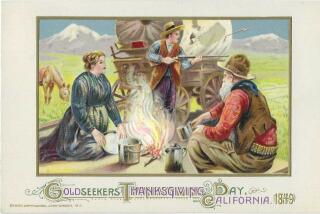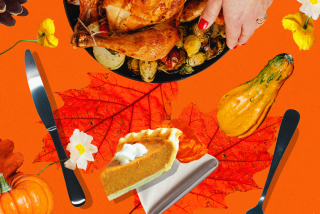Feast on American Myths
- Share via
Tomorrow is the oldest of American celebrations, in some ways the country’s truest and most valuable. Along with the Fourth of July, Thanksgiving is a holiday that speaks of optimism. The same as Veterans Day and Memorial Day, Thanksgiving is a day we devote to gratitude, not commercialism.
Naturally, the fourth Thursday of November is also a holiday encased in cartoonish myth and distortion. For, sure enough, our very own Pilgrims were religious zealots, holy warriors, fundamentalist Christian revolutionaries of a sort. And the Wampanoag Indians who shared that first feast with these Puritans 380 years ago were invited not just in brotherhood but to conclude a real estate deal that would relinquish land to their hosts.
For many years now, schoolteachers, essayists and leaders of our Indian nations have been trying to expand the traditional concept of Thanksgiving, asking us to reflect back on the events of this nation’s settlement with a greater awareness of context.
I find myself doing just the opposite. That is, Thanksgiving is the one day when I narrow my thinking about that long-ago autumn of 1621 and all the decades since.
For the remainder of the year, yes, we should applaud those who are rewriting America’s story to make it truer, less perfect, more warty, richer in its complexity. They help us remember that we have less reason to be smug than we sometimes think. Also that we have made more progress than we sometimes recognize.
But not tomorrow.
I don’t think I’m alone when I say that I cannot bear to part with the optimism and hope that Thanksgiving has come to symbolize--even if that means being stubborn about the old intent of this holiday. Tomorrow we look back with blinders on to see those things for which we can say our thanks, not in search of regrets.
Historians tell us that there really was a harvest festival that brought Pilgrims and Wampanoags together to feast at Plymouth Plantation, Mass., one year after the landing of the Mayflower. That is what we celebrate with pumpkin pie and roast turkey and cranberry sauce. Or, if you want to be authentic, with a seethed cod, a haunch of venison, fricasseed rabbit, a savory pudding of cornmeal with whortleberries and a pipe of tobacco.
For that first Thanksgiving in 1621, the celebration came naturally. The Wampanoags had helped the Pilgrims survive their first year, and the Pilgrims used the universal traditional of the harvest festival to say thanks. Two peoples found common ground and made a three-day fete of it.
My point is that we need our myths as well as the truth. Myths are the narratives that embody our ideals. They are torchlights for the journey ahead. Truth tells us where we have fallen short. Truth marks the wayward path behind.
The truth? Part of the truth, at least, is that the common ground of that first Thanksgiving was built on a foundation of suspicion, encroachment, religious friction and cultural condescension that soon found expression in bloodshed--heathen attacking invader and invader attacking heathen. Two years after the first feast, the Pilgrims were praying thanks to God for killing Wampanoa with smallpox, “thus clearing the forest to make way for a better growth,” which is how the Pilgrims saw themselves. After that, war followed.
But tomorrow, for just a day, we say our thanks. We don’t have to overlook history, just tighten our focus. We can be thankful that early in the known history of immigration into these lands, different peoples, worlds apart in their cultures, came together. And for the moment, they found their beliefs overlapping: Puritans held that good works are the obligation of all people. The Wampanoags believed that charity was owed to the needy, and in that spirit they brought most of the provisions for that original Thanksgiving, as well as an unexpectedly large number of guests.
More than 12 generations have passed since that first feast in Plymouth, but the values drawn from these two peoples, the noblesse of charity and good deeds, remain vital to the American myth. In the last century, this country also has come to regard the Plymouth feast as a pioneering, if short-lived, step toward cultural bridge-building and racial understanding.
These ideals alone are worth thanksgiving come Thanksgiving Day.
More to Read
Sign up for The Wild
We’ll help you find the best places to hike, bike and run, as well as the perfect silent spots for meditation and yoga.
You may occasionally receive promotional content from the Los Angeles Times.






